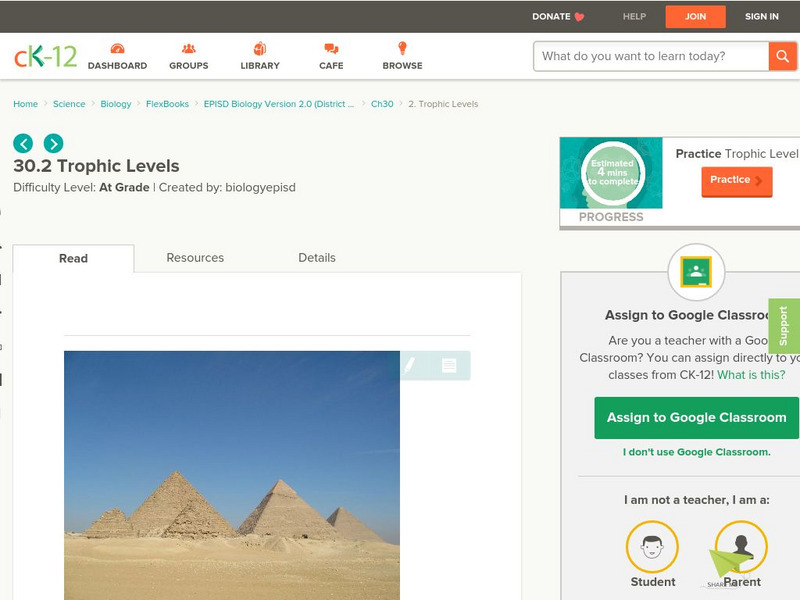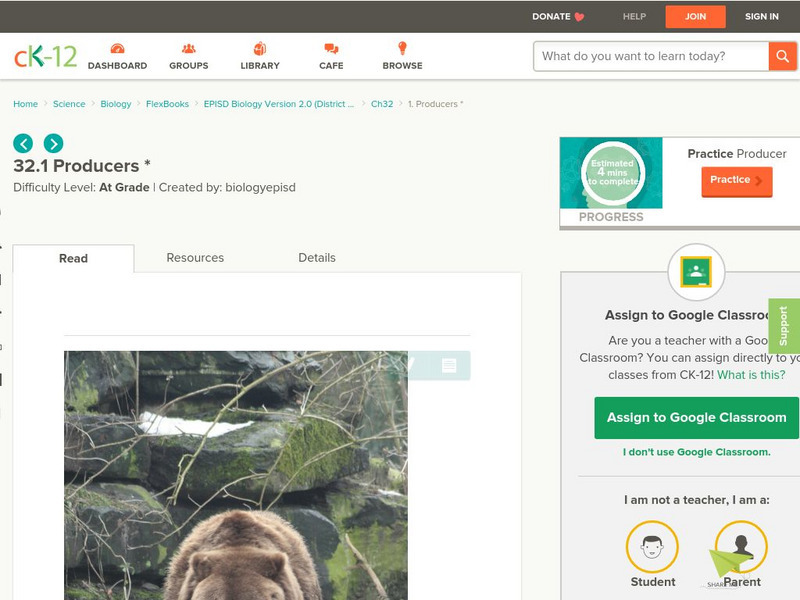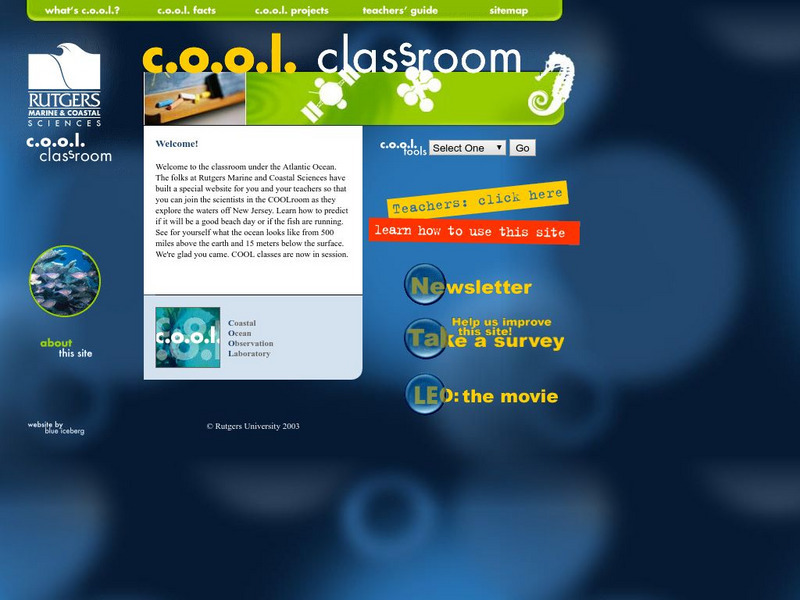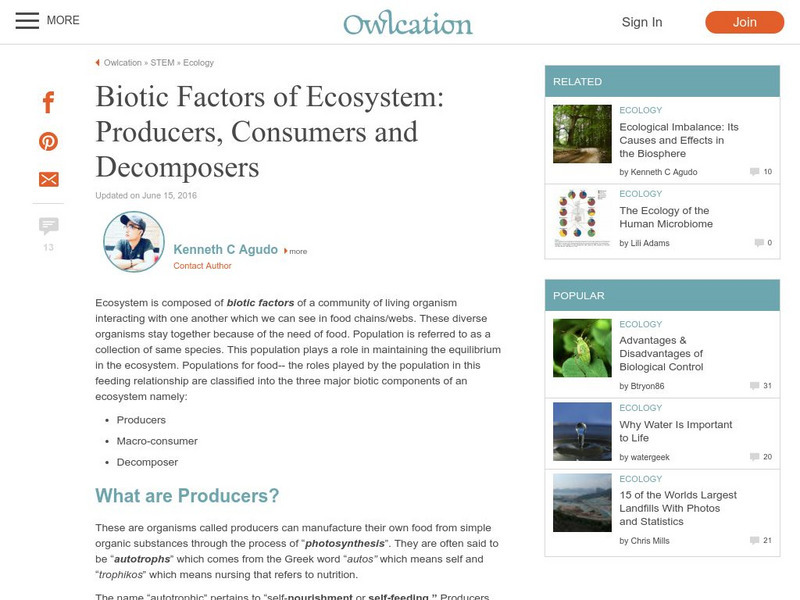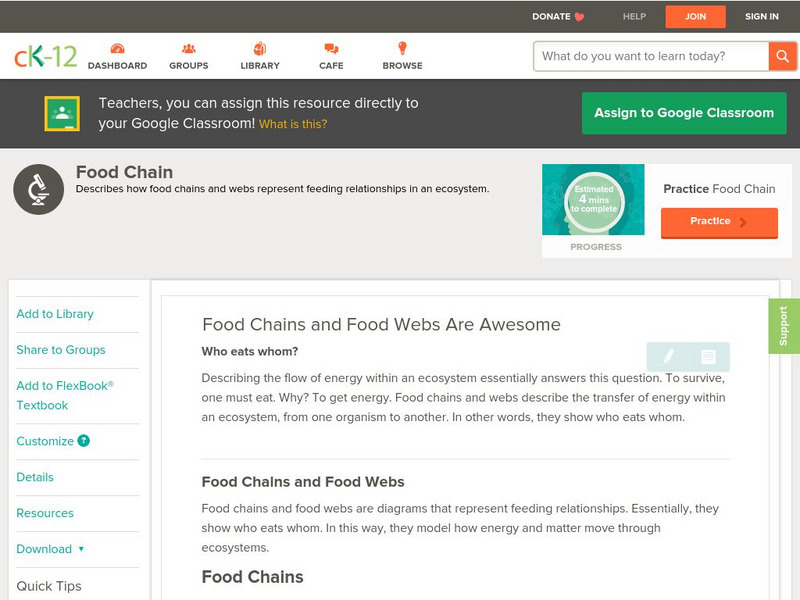Hi, what do you want to do?
CK-12 Foundation
Ck 12: Episd: Trophic Levels
[Free Registration/Login may be required to access all resource tools.] Understand what trophic levels are and identify producers and consumers in a food web.
CK-12 Foundation
Ck 12: Episd: Producers
[Free Registration/Login may be required to access all resource tools.] Students will recognize and understand the role of producers in the food chain within different ecosystems.
Annenberg Foundation
Annenberg Learner: The Habitable Planet: Ecology Lab
Create the parameters of your own ecosystem by choosing which producers and consumers live there. Visualize how the food web operates and species populations change. This simulator mimics the food web within a typical ecosystem and gives...
Other
Digital Library for Earth System Education: Teaching Box: Seasonal Upwelling
A suite of lessons focusing on the process of upwelling. Inquiry-based exploration of seasonal upwelling includes marine food webs, food production in the ocean, wind-driven ocean currents, and seasonal changes in biotic and abiotic...
TeachEngineering
Teach Engineering: Biodomes
Students explore the biosphere's environments and ecosystems, learning along the way about the plants, animals, resources and natural cycles of our planet. Over the course of lessons 2-6, students use their growing understanding of...
SMART Technologies
Smart: Energy Flow in an Ecosystem
Students learn about Abiotic and Biotic Factors and how they affect the ecosystem in which an animal might live in.
American Museum of Natural History
American Museum of Natural History: O Logy: Stuff to Do: Web of Life Game
Fun, interactive game that helps students identify interrelationships in an ecosystem. For six or more players.
Other
Rutgers Marine & Coastal Sciences: Cool Classroom
Students and teachers can explore the work of marine scientists and observe the ocean from their computers. Learn about Rutgers Coastal Ocean Observation Laboratory, discover why oceanography is important, and see what life is like in...
CK-12 Foundation
Ck 12: Biology: Mammal Structure and Function
[Free Registration/Login may be required to access all resource tools.] Describes the function of various structures in mammals.
Other
Segfl: Sebastian Swan: Pond Web
This interactive ebook "Pond Web" demonstrates a pond food chain. Students can click on the ? to find answers to questions posed in the text. Students are asked to retell the story using pictures provided at the end of the book.
Science Struck
Science Struck: Decomposers in the Ocean: Role and Examples
Describes five different types of decomposers that feed on decaying organic matter in the oceans and that are at the bottom of the ocean food chain.
Other
Hub Pages: Biotic Factors of Ecosystem: Producers, Consumers and Decomposers
An ecosystem is composed of biotic factors of a community of living organisms interacting with one another which we can see in food chains/webs. These diverse organisms stay together because of the need of food. Population is referred to...
PBS
Nh Pbs: Nature Works: Producers and Consumers
This concise site that provides an explanation of what producers are along with a short quiz to test your knowledge of producers and consumers.
OpenSciEd
Open Sci Ed: 7.4 Matter Cycling & Photosynthesis
This unit on matter cycling and photosynthesis has students investigating the idea that all food comes from plants.
Other
Kidwings: Virtual Owl Pellet Dissection
A complete lesson on owl pellets. Students can read information, watch a tutorial, and use their computer mouse to complete a dissection simulation right there on the screen.
Georgia Department of Education
Ga Virtual Learning: Ecosystems
This module offers an in depth study of the fundamental components of ecosystems. Activities include mini-lessons with videos and student assignments.
Tramline
Virtual Field Trip: Temperate Forest Biome
Travel with your students on a Virtual Field Trip to learn about Temperate Forest Biomes. You will also discover many informative and interactive websites.
Annenberg Foundation
Annenberg Learner: The Habitable Planet: Ecosystems: Energy Flow Through
Detailed explanation of the processes by which energy flows through an ecosystem. Scroll down and open Section 3.
CK-12 Foundation
Ck 12: Biology: Food Chains and Food Webs
[Free Registration/Login may be required to access all resource tools.] Describes how food chains and webs represent feeding relationships.
Science Struck
Science Struck: A Bird's Eye View of the Desert Food Chain
Describes how a food chain works in a desert and how the Mojave desert food chain works in particular.
Sophia Learning
Sophia: The Role of Plants in the Food Chain: Lesson 2
This lesson explains the role plants play in the conversion of inorganic materials into organic material to support living things. It is 2 of 3 in the series titled "The Role of Plants in the Food Chain."
Sophia Learning
Sophia: The Role of Plants in the Food Chain: Lesson 3
This lesson explains the role plants play in the conversion of inorganic materials into organic material to support living things. It is 3 of 3 in the series titled "The Role of Plants in the Food Chain."
Science Struck
Science Struck: Food Chain in the Tundra Region
Describes the characteristics of a tundra biome, how a tundra food chain compares to a tropical food chain, and what the different trophic levels look like.
Science Struck
Science Struck: Examples of Primary Consumers in the Food Chain
Explains what a primary consumer's role in a food chain is and provides examples.





